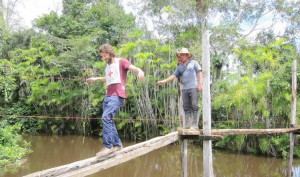“In 2013 I decided to move closer to the children so that it wouldn’t be so difficult for them to get to school. I spent two years teaching in the house of the mother of one of my pupils. That way, the children didn’t have to walk so far to find a safe place to cross the river.” Jacksy Palacios, a teacher in Balsora in the Colombian Amazon’s Putumayo region, explains the difficulties of teaching in an area where there are explosive remnants of war, such as landmines and unexploded bombs.
In Balsora, the route to school is contaminated by landmines, meaning that children were often too afraid to go, and they had to cross a river known as Caño Piñuña Negro using a dilapidated old bridge, which also meant risking their safety. As well as causing children to drop out of school and generating fear among families, this restricted locals’ access to their crops, killed their livestock and adversely affected their income.

The inhabitants of Balsora did not have a safe way of crossing the Caño Piñuña Negro. Rodrigo Marlés Osorio/ICRC 2013
When the ICRC rebuilt the bridge over the Caño Piñuña Negro, the pupils and teacher were able to return to their school building after two years away, and the 379 families from Balsora and 11 nearby villages now have a safe place to cross the river with their crops and livestock.
Safely across the river
Jacksy Palacios has dedicated her whole life to teaching in the region. She recalls how it was before the ICRC rebuilt the bridge: “There was an old wooden bridge that was in a very poor state. The children couldn’t get from one side to the other, and people couldn’t get their animals across either. It made things extremely difficult, as they had to go a really long way round.”
“When the river was high, it was even more difficult for the children. Some of the parents had small motorboats, but they often didn’t have any petrol, so the children couldn’t make it to school. There were also problems of security,” adds Jacksy.
Jacksy won’t leave the region despite the difficulties and dangers of armed conflict. She’s happy that the bridge has now been rebuilt: “Now that the bridge is there, it’s easier for the children to get to school. And at the school, we have space to work properly. It’s not the same being in someone’s house as being in a classroom, with a board and enough room. Now it really is possible for all the children in Balsora to get an education.”

The school in Balsora can now once again serve its purpose – it is the place where local children come for their education and recreation. Andrés Monroy Gómez/ICRC 2015
ICRC’s work in the region
In 2014, 11,500 people from 1,700 in urban areas, received training from the ICRC and the Colombian Red Cross on keeping safe and reducing the dangers associated with weapon contamination (from remaining explosive remnants of war).
The ICRC carried out eight infrastructure projects in 2014, repairing and upgrading school facilities, water facilities and a bridge. These projects improved access to education and water, as well as the overall living conditions of people affected by weapon contamination.
The ICRC’s confidential dialogue with the communities concerned and the different parties to the conflict is extremely important for these projects. Some 200 victims of weapon contamination and their families received advice on how to access State services and obtain compensation for the injuries and harm they had suffered. Additionally, close to 1,800 victims of weapon contamination received advice, assistance, financial support and medical care.

